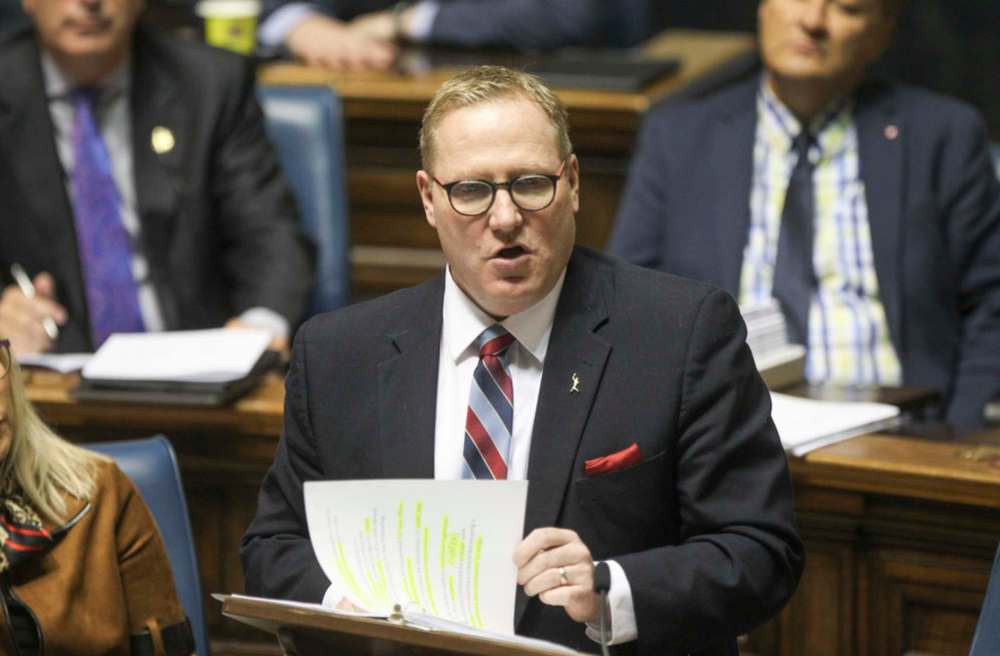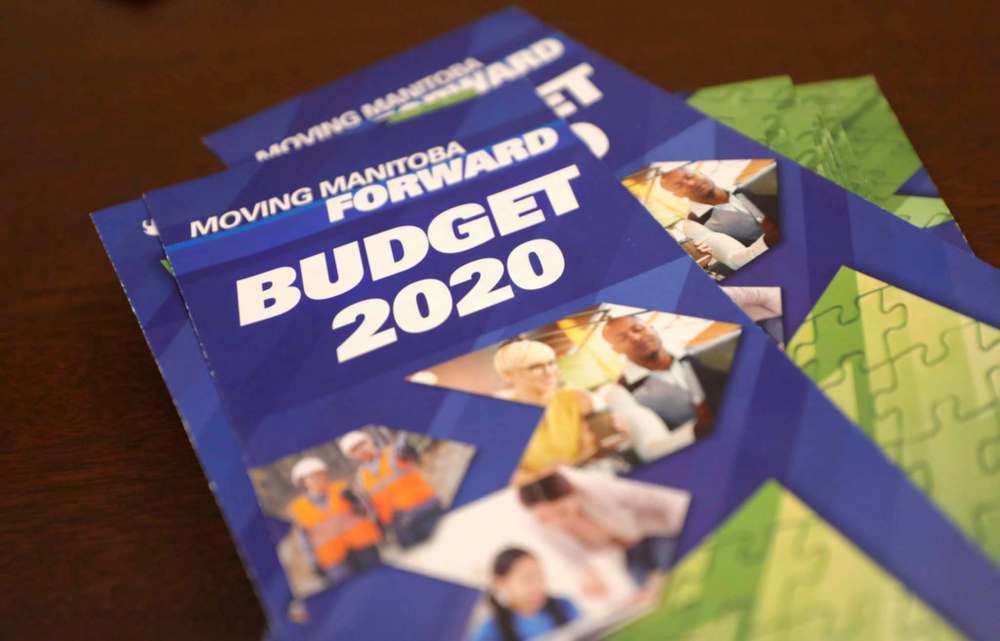Budget offers no insight into challenge health-care system faces
Advertisement
Read this article for free:
or
Already have an account? Log in here »
To continue reading, please subscribe:
Monthly Digital Subscription
$0 for the first 4 weeks*
- Enjoy unlimited reading on winnipegfreepress.com
- Read the E-Edition, our digital replica newspaper
- Access News Break, our award-winning app
- Play interactive puzzles
*No charge for 4 weeks then price increases to the regular rate of $19.00 plus GST every four weeks. Offer available to new and qualified returning subscribers only. Cancel any time.
Monthly Digital Subscription
$4.75/week*
- Enjoy unlimited reading on winnipegfreepress.com
- Read the E-Edition, our digital replica newspaper
- Access News Break, our award-winning app
- Play interactive puzzles
*Billed as $19 plus GST every four weeks. Cancel any time.
To continue reading, please subscribe:
Add Free Press access to your Brandon Sun subscription for only an additional
$1 for the first 4 weeks*
*Your next subscription payment will increase by $1.00 and you will be charged $16.99 plus GST for four weeks. After four weeks, your payment will increase to $23.99 plus GST every four weeks.
Read unlimited articles for free today:
or
Already have an account? Log in here »
Hey there, time traveller!
This article was published 19/03/2020 (2097 days ago), so information in it may no longer be current.
As Finance Minister Scott Fielding finally stood on Thursday and delivered a provincial budget that is already profoundly out of date thanks to the rapidly advancing COVID-19 pandemic, Manitobans are left with many questions, particularly when it comes to health services.
For the past four years, the Progressive Conservative government has applied unrelenting expenditure control on its health-care portfolio including few real increases in funding, an imposed wage freeze for physicians, nurses and other health-care workers and a completely new structure for hospital services in Winnipeg. None of those initiatives anticipated something as big and as destructive as the COVID-19 pandemic. Now, we get to see whether a system that has been stretched to the limit can meet its biggest challenge ever.
On its own, this budget will not give us any insight into that challenge.

Despite the fact that his economic assumptions and estimates of expenditure are hilariously outdated, Fielding continued on Thursday to promise Manitobans that this was the “most emergency-resilient,” budget in the province’s history. In total, Fielding says Manitoba has put aside nearly $1 billion to deal with the double impact of the spread of COVID-19 and significant spring flooding.
That is a lot of money. But if the experience of other jurisdictions is considered, it will be profoundly insufficient on its own to deal with the trouble that is headed our way. The pandemic is not just a medical emergency; it is also an economic catastrophe and Fielding’s budget has no specific measure to deal with the impact on individuals or businesses.
And when it comes to health care, it’s important to note that some of the problems can’t be solved with money.
The biggest health-care challenge going forward is the reaction of the people who work within the system. Will doctors, nurses and others step up in aid of a system that has left them financially squeezed and structurally strung out? Nurses have been especially hard-hit by the decision to strip three hospitals of emergency departments and relocate other hospital programs.
In general, anyone looking in this budget for gestures to restore the faith of the people who toil within the health-care system will be sorely disappointed.
Total health spending is estimated to be $6.819 billion in the forthcoming fiscal year. Again, that is a lot of money but it’s a very small increase over what was spent last year ($6.696 billion) when there was no pandemic threat, and not appreciably more than it spent four years ago ($6.475 billion) when the Tories took over from the NDP. Not to worry; the health estimate tabled by Fielding this week will quite likely get blown out of the proverbial budget pond over this next year.
It is true that the quality of health care cannot be measured solely by the quantity of money you spend. However, it’s also true that you get what you pay for and in general, Manitobans are not getting more health care than they got four years ago. In some areas, like ER and elective surgical wait times, we’re slightly worse off than we were when the Tories took over.
In looking at the very meagre increases in this budget, it would be easy to lose sight of a tremendous amount of advanced preparation by health-care professionals. But it’s also fair to raise concerns about the fact that Tory health-care reforms are still very much a work in progress and the pandemic is hitting us at a very inopportune time.
The biggest concern — hospital reorganization — is still going through some growing pains. Nursing vacancies in critical care areas are still too high. Rather than move to hospitals and new jobs that were incompatible with the demands of their lives outside work, many nurses are working fewer hours. Some are not working at all.
There are also capacity concerns. Some of the three remaining ERs have already been overwhelmed by patient volumes, even before COVID-19 came on the scene. And the Manitoba Nurses Union was threatening to “grey-list” facilities — a recommendation to union members to refrain from applying for jobs at a particular hospital — over high vacancies and equipment or medical supply shortages.

Efforts are being made to address nursing concerns and address vacancies. The province is looking to fast-track the recertification of retired nurses. The province also graduated 30 nurses in February from a rapid response critical care training program to address some of the vacancies at the biggest hospitals.
On other issues, however, there is still conflict. Like on the issue of protective equipment.
Shared Health issued provincewide clinical standards that currently do not allow nurses performing COVID-19 tests to wear N95 masks, the highest-rated medical masks available. N95 masks are reserved for “aerosol-generating” medical procedures like cardiopulmonary resuscitation, autopsies and intubations.
The MNU believes nurses should be allowed to wear N95 masks for COVID-19 tests, which involve sticking a swab into the back of a patient’s throat and often triggers coughing. Nurses in Saskatchewan have made a similar demand even though most guidelines from public health agencies, and other provincial health services, do not approve N95 masks for simple COVID-19 tests. That may seem like a disagreement over clinical standards. But for many nurses, it is being interpreted as a provincial government ignoring their concerns. Again.
This budget does have financial room to shore up a health-care system that is still, in many ways, reeling from the combined impact of austerity and restructuring. But if we know anything about COVID-19, it is that a rapidly spreading virus has no regard for normal government planning and preparation. Time is not on our side.
dan.lett@freepress.mb.ca

Born and raised in and around Toronto, Dan Lett came to Winnipeg in 1986, less than a year out of journalism school with a lifelong dream to be a newspaper reporter.
Our newsroom depends on a growing audience of readers to power our journalism. If you are not a paid reader, please consider becoming a subscriber.
Our newsroom depends on its audience of readers to power our journalism. Thank you for your support.
History
Updated on Thursday, March 19, 2020 7:26 PM CDT: Adds photo


